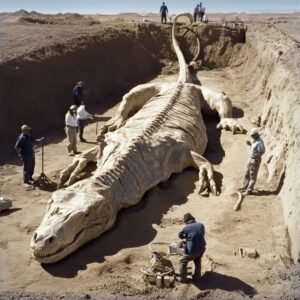The world of archaeology is a treasure trove of mysteries waiting to be uncovered, and 2024 has already proven to be a groundbreaking year for unexpected finds that have left both experts and enthusiasts in awe. From ancient civilizations to lost artifacts, this year’s discoveries have not only expanded our understanding of human history but have also sparked debates about our past that no one saw coming.

One of the most astonishing discoveries this year took place in the heart of the Amazon rainforest, where researchers stumbled upon an extensive network of ancient urban settlements. For decades, the prevailing narrative suggested that the Amazon was largely inhabited by small, nomadic tribes. However, the excavation of these large, interconnected cities, complete with sophisticated infrastructure and advanced agricultural techniques, challenges this long-held belief. The findings suggest that the Amazon was home to a vibrant civilization that thrived long before European contact, prompting a reevaluation of our understanding of pre-Columbian societies and their environmental impact.
In another surprising turn, archaeologists in Egypt unearthed a hidden chamber within the Great Pyramid of Giza. Utilizing advanced scanning technology, they discovered a previously unknown void measuring about 30 meters in length. This extraordinary find has ignited speculation about the purpose of the chamber and what treasures or artifacts might lie within. As researchers prepare to investigate further, the implications of this discovery could shed new light on the construction techniques and cultural significance of one of the world’s most iconic structures.

Meanwhile, in Italy, a team of archaeologists unearthed a stunning mosaic in the ruins of an ancient Roman villa. This mosaic, depicting intricate scenes of daily life, was remarkably well-preserved and dates back to the 2nd century AD. What makes this find particularly shocking is the depiction of figures that challenge previous notions of gender roles in ancient Rome. The mosaic illustrates both men and women engaging in activities typically associated with the opposite gender, leading scholars to reconsider the social dynamics of Roman society. Such discoveries not only enrich our understanding of history but also encourage us to question long-standing stereotypes.
In the realm of ancient technology, a groundbreaking discovery in China has left historians astounded. Researchers found evidence of advanced metallurgy dating back over 3,000 years, including the use of steel and sophisticated casting techniques. This revelation suggests that ancient Chinese civilizations were far more technologically advanced than previously recognized. The implications of this finding could reshape our understanding of global technological development and trade routes in ancient times, highlighting the interconnectedness of civilizations.
Additionally, a remarkable find in a remote cave in Spain has revealed ancient cave paintings that are estimated to be over 40,000 years old. These paintings, depicting a variety of animals and abstract symbols, are believed to be created by some of the earliest humans in Europe. What makes this discovery particularly shocking is the evidence suggesting that these early artists may have had a sophisticated understanding of the natural world, as the depictions show not only artistic skill but also a deep connection to their environment.

As 2024 unfolds, these discoveries serve as a reminder of the ever-evolving nature of archaeology. Each find challenges our preconceived notions of history and encourages further exploration into the lives of our ancestors. The excitement surrounding these revelations is not just in the artifacts themselves but in the stories they tell and the questions they raise about our shared human experience.
In conclusion, the archaeological discoveries of 2024 have not only shocked the academic community but have also captured the imagination of the public. As researchers continue to investigate these remarkable finds, we can only anticipate what other secrets the past holds. The journey of uncovering our history is far from over, and each new discovery brings us one step closer to understanding the intricate tapestry of human civilization.
[embedded content]




